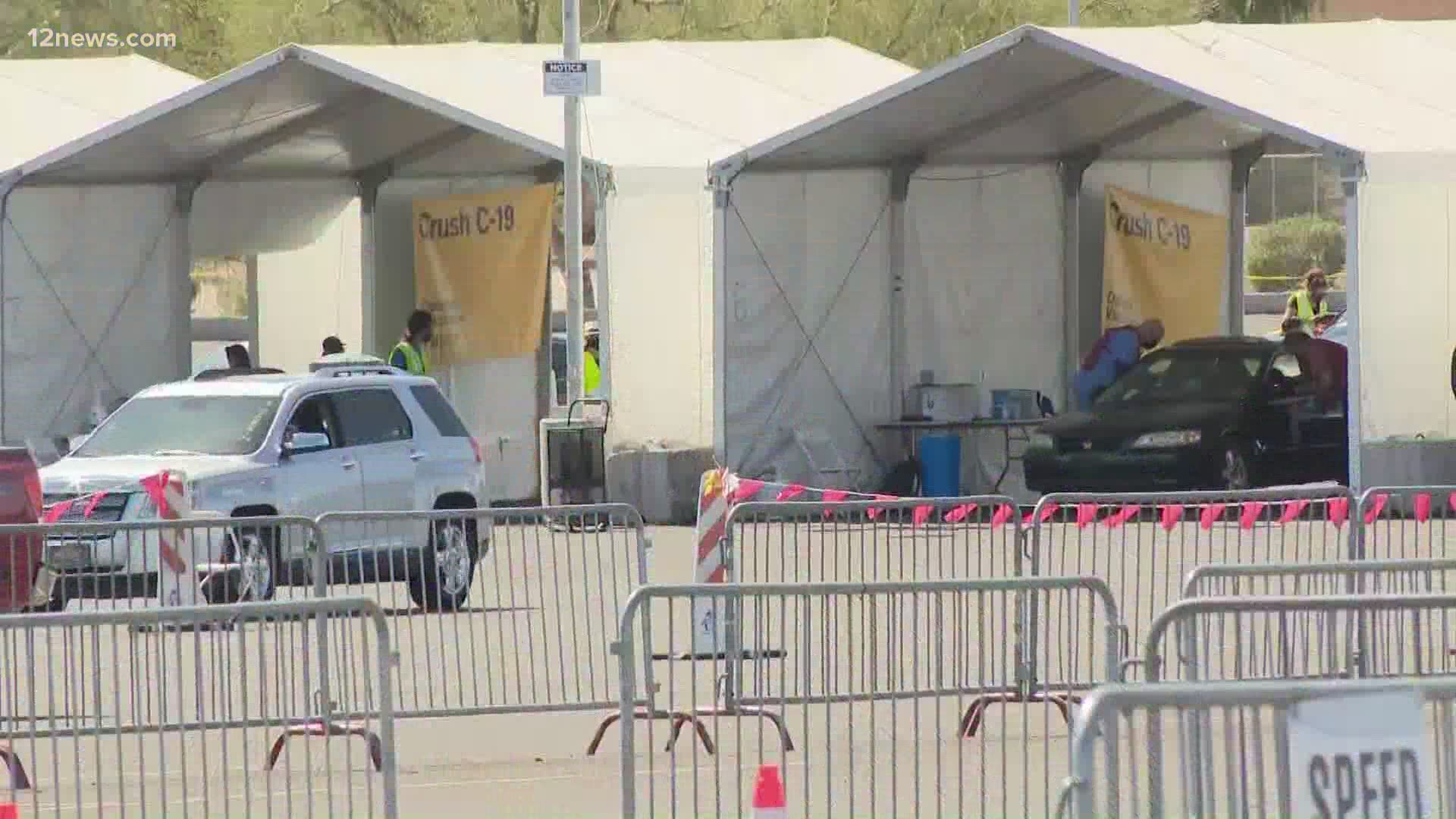PHOENIX — The acting regional administrator for FEMA recently expressed concern to the head of the Arizona Department of Health Services over reservations that the director shared with the press earlier this month.
In a letter to ADHS Director Dr. Cara Christ, FEMA Acting Regional Administrator Tammy Littrell said she’s “concerned” that conversations the pair had earlier in the week did not include reservations Christ shared with the press on March 19.
FEMA said it had offered Arizona a Community Vaccine Center to administer COVID-19 vaccines that would be federally supported and focused on highly populated areas with vulnerable communities.
In a statement to 12 News, the department said it appreciates the opportunity to work with FEMA, but added "the state does not need assistance in standing up additional fixed or mobile resources.
"Instead of using federally allocated vaccine at a site that doesn’t currently exist and requiring the state to staff and operate the site, more efficient use of the vaccine would be to administer the doses at one of our currently operating locations," part of the statement read.
"As we have worked with our FEMA partners, we have continuously requested additional vaccine to support the unfilled capacity at these sites. At FEMA’s direction, we have put in multiple requests for additional vaccine. Each time our request has been denied."
The FEMA letter states the CVC would coordinate with state and local health officials and include:
- Additional 8-week supply of the COVID-19 vaccines
- Clinical and administrative staff
- 100% federal funding
Last week, Christ stated a CVC would not allow for state oversight and would have to provide significant staffing and resources to operate.
The letter stated that FEMA remains committed to helping Arizona with vaccine efforts.
Vaccine supply integrity:
Littrell said a CVC would not draw from existing allocations to the state.
Christ previously told reporters that it was unclear if the state would have to send allocations to the CVC site.
In the letter, Littrell reiterates FEMA’s offer “was to expand existing capabilities in Arizona with vaccine, staff and funding.”
Oversight and partnership:
Christ told reporters the CVC would not allow for state oversight.
Littrell said they sought an “active partnership and would leverage the state’s strengths in vaccination center operation.”
“The partnership would also have guided site selection, to include the option of working together to open an already planned site.”
Customer experience and long delays:
Littrell took issue with Christ's characterization of CVC sites experiencing four to five-hour-long wait times to be vaccinated.
“There may be isolated cases,” said Littrell. However, “that is not the expectation for the site we offered.”
The letter concluded with Littrell stating FEMA respects the state’s decision to “turn down the offer of an additional, federally supported vaccination center” and reiterated their desire to support vaccination efforts in Arizona.
Read the full FEMA letter in the tweet thread and embed below:
Read the full response from the Arizona Department of Health Services:
"We appreciate the opportunity to partner with FEMA on the development of new opportunities. However, the state does not need assistance in standing up additional fixed or mobile resources. Instead of using federally allocated vaccine at a site that doesn’t currently exist and requiring the state to staff and operate the site, more efficient use of the vaccine would be to administer the doses at one of our currently operating locations. As we have worked with our FEMA partners, we have continuously requested additional vaccine to support the unfilled capacity at these sites. At FEMA’s direction, we have put in multiple requests for additional vaccine. Each time our request has been denied.
"Arizona, not the county, would need to provide a significant portion of the staffing and resources, would not have administrative or medical oversight of the site, and could not require the same efficiency and customer service provided at existing state sites that still have significant untapped capacity. While the county believes they could provide everything needed, the state holds the primary responsibility for ensuring the resource needs are met. The state is required to provide the resources if they cannot. Arizona, not the county, would need to provide a significant portion of the staffing and resources,
"In addition to the state-operated mass-vaccination sites, Arizona has sufficient capacity with our local partners, pharmacies, and federally qualified health centers to provide fixed, community-based, and mobile clinics. For example, there are still over 300 pharmacies onboarded and willing to administer the vaccine, but because of the limited vaccine supply, have not received any doses. Multiple community-based providers, who are trusted resources for our underserved and hardly reached communities at high risk for COVID-19, have only received small amounts of vaccine to provide community-based vaccination clinics.
"Our sites are sufficiently staffed and resourced, have proven to be highly efficient, and have significant unfilled capacity to administer vaccine."
Read the letter below:
COVID-19 News and Updates
Subscribe to the 12 News YouTube channel to receive notifications on the latest videos about the latest information on the coronavirus.

